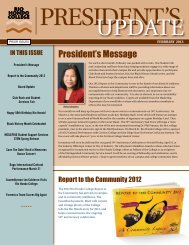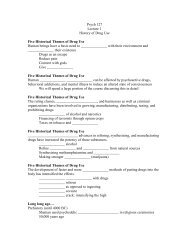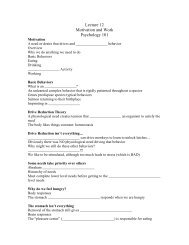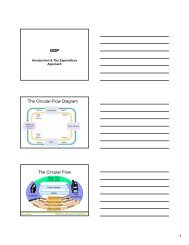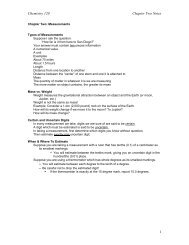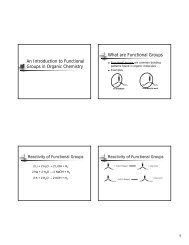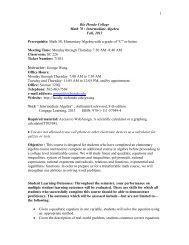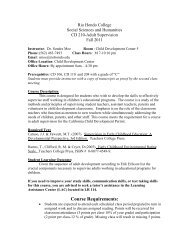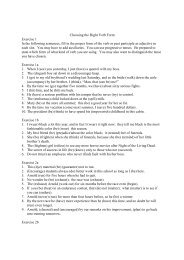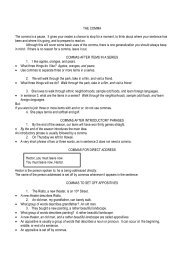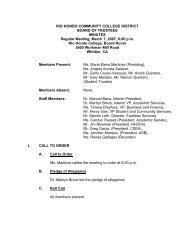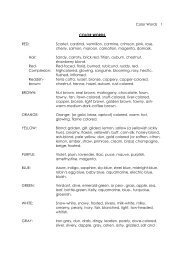Complete College Catalog 2011-2012 - Rio Hondo College
Complete College Catalog 2011-2012 - Rio Hondo College
Complete College Catalog 2011-2012 - Rio Hondo College
Create successful ePaper yourself
Turn your PDF publications into a flip-book with our unique Google optimized e-Paper software.
PSY 190<br />
Statistics for the Behavioral Sciences<br />
Prerequisite: MATH 070 with a grade of<br />
“C” or better or appropriate assessment<br />
Advisory: ENGL 101 or appropriate<br />
assessment; READ 023 or appropriate<br />
assessment<br />
Transfers to: UC, CSU<br />
This course provides an overview<br />
of the types of statistics that are<br />
important in the behavioral sciences.<br />
The main focus of this course is on<br />
hypothesis testing and the statistics<br />
that are used to analyze it. Students<br />
will learn to present and interpret<br />
experimental data from the behavioral<br />
sciences. Topics covered include<br />
basic probability, measures of central<br />
tendency, measures of variance,<br />
sampling, and inferential statistics.<br />
This course is designed for students<br />
majoring in psychology, sociology,<br />
political science, and anthropology.<br />
4 Units<br />
72 Lecture hours<br />
PSY 200<br />
Research Methods in Psychology<br />
Prerequisite: PSY 101<br />
Prerequisite/Corequisite: MATH 130<br />
Advisory: ENGL 035 or ESL 198 or<br />
appropriate assessment; READ 023 or<br />
appropriate assessment<br />
Transfers to: UC, CSU<br />
This course provides an introduction<br />
to the philosophy of science and<br />
the examination of the hypothetical<br />
deductive methods and their<br />
relationship to theory. Topics include:<br />
the nature of experimental research<br />
and design, experimental and nonexperimental<br />
research-including group<br />
and single-subject designs, literature<br />
review, research ethics, collection and<br />
analysis of data, and writing APAstyle<br />
reports. Collection, handling, and<br />
analysis of original empirical data,<br />
during class and outside of class, in<br />
both experimental and nonexperimental<br />
designs, are an integral component of<br />
the course. The course is designed for<br />
students intending to pursue a degree in<br />
psychology.<br />
3 Units<br />
36 Lecture hours<br />
54 Lab hours<br />
PSY 210<br />
Biological Psychology<br />
Prerequisite: PSY 101<br />
Advisory: ENGL 035 or ESL 198 or<br />
appropriate assessment; READ 023 or<br />
appropriate assessment<br />
Transfers to: UC (credit limit*), CSU<br />
(*Students will receive credit from UC<br />
for only one of the following courses:<br />
PSY 210 or PSY 210H)<br />
This course is designed for the student<br />
who has an interest in understanding<br />
the biological processes that underlie<br />
human behavior. The biological basis<br />
of normal and abnormal behavior,<br />
including sensory systems, brain<br />
and behavior relationships, and<br />
underlying neurochemical processes<br />
will be addressed. The extent to which<br />
biological processes interact with<br />
environmental influences to determine<br />
behavior will be explored.<br />
3 Units<br />
54 Lecture hours<br />
PSY 210H<br />
Biological Psychology<br />
Prerequisite: PSY 101 and ENGL 101<br />
with a “C” or better. Enrollment is<br />
restricted to those who meet Honors<br />
Program requirements (minimum GPA<br />
of 3.0)<br />
Advisory: READ 023 or appropriate<br />
assessment<br />
Transfers to: UC (credit limit*), CSU<br />
(*Students will receive credit from UC<br />
for only one of the following courses:<br />
PSY 210 or PSY 210H)<br />
This course is designed for the student<br />
who has an interest in understanding<br />
the biological processes that underlie<br />
human behavior. The biological basis<br />
of normal and abnormal behavior,<br />
including sensory systems, brain<br />
and behavior relationships, and<br />
underlying neurochemical processes<br />
will be addressed. The extent to which<br />
biological processes interact with<br />
environmental influences to determine<br />
behavior will be explored.<br />
3 Units<br />
54 Lecture hours<br />
PSY 299<br />
Directed Study: Psychology<br />
Transfers to: UC, CSU<br />
The course is intended for students<br />
who have the ability to assume<br />
responsibility for independent work<br />
and to prepare written or oral reports<br />
and/or appropriate projects; who<br />
possess a 2.5 overall grade point<br />
average and/or a 3.0 grade point<br />
average in a major, or for whom the<br />
instructor feels an exception should<br />
be made. Directed Studies may be<br />
developed from any topic arising<br />
from or related to a course of study<br />
that will result in developing depth<br />
and breadth in that subject area.<br />
The project title will vary with each<br />
individual project. Students will be<br />
expected to meet on a regular basis<br />
with their faculty sponsor and submit<br />
a final report or project. One unit of<br />
credit will be awarded for 48 hours<br />
of directed studies, 6 hours of which<br />
must be with an instructor. A student<br />
may take this course for a maximum<br />
of 4 units within a discipline, but may<br />
not accumulate more than a total of 12<br />
units college wide.<br />
1 to 3 Units<br />
48 to 144 Hours<br />
____________________<br />
RADIO<br />
Division of Communications &<br />
Languages<br />
RDIO 104<br />
Introduction to Broadcasting<br />
Advisory: ENGL 035 or ESL 198 or<br />
appropriate assessment; READ 022 or<br />
appropriate assessment<br />
Transfers to: CSU<br />
This course is a broad survey of the<br />
history, theory, and operation of<br />
radio and television broadcasting<br />
in the United States, including<br />
legal and social aspects, networks,<br />
programming, production, sales and<br />
advertising, and station personnel.<br />
At least one field trip to a radio or<br />
television studio will be scheduled<br />
each semester.<br />
3 Units<br />
54 Lecture hours<br />
RDIO 136<br />
Radio Production<br />
Advisory: ENGL 035 or ESL 198 or<br />
appropriate assessment; READ 023 or<br />
appropriate assessment<br />
Transfers to: CSU<br />
This course is intended as an<br />
introduction for students wanting to<br />
learn the production and management<br />
techniques in radio broadcasting.<br />
Students will be shown basic<br />
techniques for writing and producing<br />
the commercial and public service<br />
type announcements. Students<br />
will be shown through lecture,<br />
demonstration, and taped examples<br />
the proper announcing and on-air<br />
presentation techniques. Students<br />
will make demonstration tapes and air<br />
checks of examples of their work for<br />
submission to the instructor and the<br />
class for evaluation. Selected students<br />
will have an opportunity to air their<br />
programs over the campus radio<br />
station KRHC.<br />
4 Units<br />
54 Lecture hours<br />
72 Lab hours<br />
RDIO 199<br />
Radio Internship<br />
Prerequisite: RDIO 236 with a grade of<br />
“C” or better<br />
Transfers to: CSU<br />
This course is designed to provide<br />
radio students with on-the-job<br />
training in the radio profession.<br />
Students may be involved in any or<br />
all of the following professional areas:<br />
broadcast, studio, club, party and<br />
contract agency, talent, management,<br />
or technical. This course may be taken<br />
once and repeated one time for credit.<br />
3 Units<br />
18 Lecture hours<br />
144 Hours<br />
242 / <strong>Rio</strong> <strong>Hondo</strong> <strong>College</strong> <strong>2011</strong>-<strong>2012</strong> <strong>Catalog</strong>



